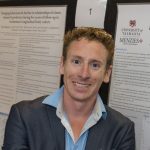The ANZgene and Proteomics platforms are very successful MS Research Australia coordinated collaborations. They have been running over a number of years and produce high quality research. These platforms produce a large amount of data which can be used to answer questions about MS that were not original included in grant applications.
Dr Lea is a bioinformatics specialist and will provide support primarily to these two MS Research Australia platforms. Bioinformaticians are multidisciplinary scientists who are trained in biology, computational techniques and information theory and provide valuable analysis expertise for large datasets, such as those generated in whole genome and proteome analysis.
Dr Lea has been involved with an impressive number of projects which he works concurrently. Over the course of his fellowship, Dr Lea has compiled and applied a comprehensive set of methods to analyse in more detail the original gene data from ANZgene. These investigations will look for specific changes such as interactions between networks of genes and differences according to gender that may be linked to the X and Y sex chromosomes.
Dr Lea has also been involved with an analysis of a rare genetic change identified in the Australian MS population. A further analysis of the activity levels of genes will integrate information about direct changes to the genetic code – an important step that is often missing in gene activity studies.
Epigenetics is the study of how a gene is turned on or off by mechanisms that are independent of the genetic code. In 2016, Dr Lea focused on developing mathematical methods for understanding epigenetic data. Of note, is the development of a method that allows data for a single type of cell to be extracted from data from a group of cells. This is a major achievement as previous studies have stored mixtures of cells, and this will allow researchers to determine specific information from mixed data sets. Further, it allows the number of each cell type to be determined from samples that are not able to be separated prior to storage. Using this method, Dr Lea and others have provided evidence that certain epigenetic changes are associated with an increased risk of developing MS.
Dr Lea is also working with Professor Shaun McColl, chair of the MS Research Australia proteomics platform, on a study looking at a newly identified cell of the immune system known as Th17-GM cells.
Dr Lea’s support has allowed the AUSLONG project obtain funding from the highly competitive NH&MRC.
As these many studies demonstrate, the methods developed by Dr Lea continue to provide much needed support for MS researchers around the country. We look forward to his further results with much interest.
Updated: 17 July 2017
Dr Rod Lea
$72,500
2013
Past project

